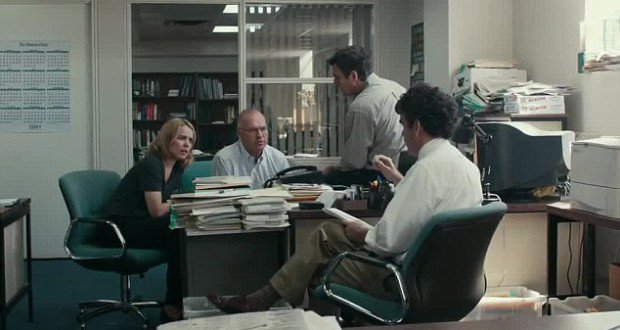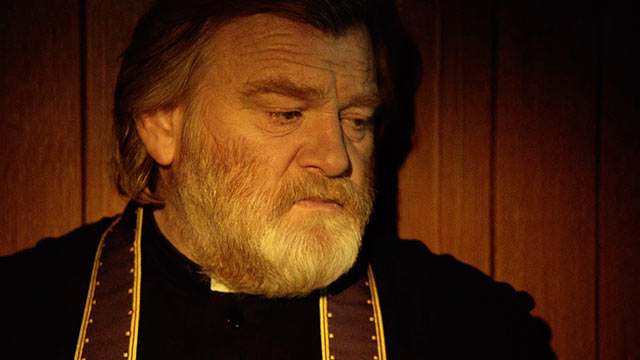Forgive Me, by Reed Lackey
27 Feb
I don’t know of a single person in my life that has not at one time or another been failed by the Church. Either through hypocrisy, condemnation, neglect, politicizing, or even outright abuse, I think everyone has or eventually will experience disappointment with the institution which claims to be the people of God on Earth. Some of these failings are matters of personal perspective, but some, like the ones I saw handled in the two films I’m about to discuss, are issues of deep violation and betrayal.
Nominated for a handful of Oscars this year is a film by Tom McCarthy called Spotlight. It handles in an honest and graceful way the examination by The Boston Globe’s specialty investigative team into the numerous incidents of molestation and abuse towards minors committed by priests. As a film, it is masterfully executed and sensitively told. You feel, as the audience, a deep sense of ache as you hear the mere fraction of stories of people who trusted the church and surrendered to the church and placed their hope in the people who led the church and were repaid with immense violation not only of their physical and emotional selves, but of their faith as well. As a devout Christian, although non-Catholic, the film made me feel the burden of responsibility that was at risk here: for the church, for the newspaper, and for the city.
I cringed when one character tried to bury, or at the very least minimize, the scandalous truth by saying, “This city needs the Church, now more than ever.” It struck me that the city always needed the church, but most especially the victims who were being violated by members of the church needed it. They needed it to be better to them than it was. The capacity for an institution, of any foundation, to believe that its ultimate goals are more important than the violations it commits at its lowest levels is hideous to me. The city needed the church to not abuse its members. When that happened, the city needed the church to take responsibility for it. In that sense, the Spotlight journalists were, perhaps, doing as much of the Lord’s work as the church ever had.
I’ve experienced my own share of violations by fellow Christians. Unfair accusations, misguided legalism, and a heightened sense of control-through-fear were common among my peers and our leaders growing up in the church. I was never, nor would I disrespect the victims by claiming to be, on the same level of violation as those whose story Spotlight tells. But, I bear scars that do not feel that they’ve yet been redeemed, let alone healed. I feel some sensitivity towards atheist or even faith-apathetic friends who tell me they’ve had a bad experience with Christians. It’s sad to me, but trust me, I get it.
But Spotlight also reminded me of another recent movie, one that in many ways deals with the same subject from the other side of the pulpit. The 2014 film by John Michael McDonagh called Calvary opens with a priest who is hearing the confession of a man we cannot see. This man tells the priest, in somewhat graphic detail, of the personal sexual abuse he had suffered at the hands of a priest when he was a boy. He then tells the priest that, in one week’s time, he will kill him as punishment for this offense, even though he knows that the priest he is threatening has done nothing wrong.
What we see in Calvary is an almost exact counterpoint to what we see in Spotlight. We see a good man, well-meaning and sincere– although by no means a saint– being forced to answer for crimes against his people simply because he is a part of the institution which has committed them. In Spotlight, the journalists are combatting a network of people who justify, dismiss, and hide the abuses of its priests at the cost of the soul of its city. In Calvary, a man with no pretense– who is not justifying, condoning, or dismissing anything– is fighting for the soul of a town where the people have long ago lost faith in God and in His church. They treat him with skepticism, ridicule, and even more ominously violent gestures, while all he wants to do is help where he can.
Both films are asking the same things. “What are good people to do, within or outside of the church, when such violations occur?” It is a tremendous subject, too vast for these brief observations here. But both of these films should be praised for starting the conversation and for refusing to settle on easy answers when there are none. There is a cost when trust is violated. There is a cost when that violation is held accountable. And the worst of it is that those who often pay the most on both sides are the ones who deserve it the least. I cannot make that statement without remembering the cross upon which the Christian faith is founded.
There are two things which most resonated in me as I reflected on both films. The first was the power of confession. In Spotlight, the entire pursuit of the investigative team could be boiled down to an effort to extract a confession from the Church. Lacking anyone to take responsibility for the misdeeds of its priests, the journalists are forced to print the story exposing the scandal. The film is not merely about uncovering the truth; it is about holding accountable those who would seek to hide it. Making them confess. In Calvary, the film both begins and ends in confession booths of different kinds, though I’d be spoiling too much to explain why.
But the films present two different drives toward confession as well as two different responses. In Spotlight, one character tragically comes to realize that they had an opportunity to expose the scandal five years earlier, but for reasons they can’t remember, they let it go back then. Their confession is met with encouragement and grace, ironically from someone whose authority does not stem from the church. In Calvary, truthfulness and vulnerability through confession is met with disgust and bitterness, and a good man must then decide if it is his responsibility to answer for the sins of his brothers, even in the face of all the good he could still do if he didn’t suffer those consequences. I won’t say how he’s responded to because it is complicated and worth seeing for yourself. It may leave you wondering if he did the right thing, and what the right thing might be if he didn’t.
Confession can be terrifying. It can threaten to undo all of the good we do through a single admission of guilt. So we hide. We cover up. We pretend that making omelets by breaking eggs somehow justifies the hurt that we’ve caused those who trusted us. And we have to stop. We have to be accountable and we have to stop pretending that the harm we’ve done is excused by the good we bring. We do more good by taking responsibility for wrongdoing than when we try to pretend none exists.
But what we’re really afraid of is that on the other side of confession, there won’t be the forgiveness we desperately long for. And we do long for it. We long to be forgiven and for the permission to forgive ourselves. We look for someone to see where we’re hurting and acknowledge that things haven’t been easy, particularly when what is happening around us is not our fault. We hear of the power of forgiveness and the promise of it and the purpose of it, but these things don’t compare to the longing we have to experience it, fully and completely, which is a rarer experience than we’d like to admit.
In Calvary, one character makes a particularly powerful observation to someone who has no idea how much weight it carries. They say, “I think there’s too much talk about sins and not enough about virtues.” To which the person they’re speaking with replies, “What would be your number one?” And without hesitation, they respond, “I think forgiveness has been highly underrated.”
But what both “Spotlight” and Calvary seem to shine some light on is the truth that real forgiveness is not the act of sweeping wrongdoings under a rug. In fact, such behavior is categorically unforgiving. Forgiveness does not shelter wrongdoing in the dark, where it can fester and breed and take root. Forgiveness brings sins out into the light where they lose their power. It compels confession so that we can be free from the wrongdoings which hold us prisoner. It understands the cost of moving on and letting go. Some things can never quite be the same, but through forgiveness, they might be able to transform into something greater.
And if the cross tells us anything, it tells us that forgiveness is not naive to suffering or to the cost of sin. It does not excuse or cover up sins. It bears the cost of those sins upon itself. That is its power: it pays the cost.
Forgiveness has blood on its hands, but mostly its own.





No comments yet